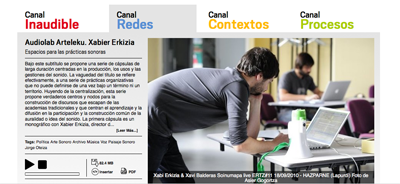[audiolab] OPEN SOUND
Monday, December 12th, 2011APO33 – Nantes – France – Coordinator
AntiTesi – Palermo – Italy – Partner
Piksel – Bergen – Norway – Partner
Granular – Lisbon – Portugal – Partner
Audiolab -Donostia-San Sebastian – Spain – Partner
ModusArts – London -England – Partner
N.K. – Berlin – Germany – Partner
The principle of exchange defines the Open Sound Project – between countries, partners and, of course, learning groups. It wants to break with polarities between teachers and learners, professional artists and passive audiences, choosing the concept of the “ignorant schoolmaster” for mutual learning, for a collective discovery of the sound world, understanding tools to produce sound and ideas to organize it in an artistic form. The Open Sound partnership will organize workshops, conferences and diffusion events, focusing on different aspects of the project, using a non-formal integrative approach, exchanging know-how and experience based on the specific situation of their respective countries.
Sound and Art Context:
Historically speaking, sound art, and auditory culture more generally, has been typified by interdisciplinary and experimental practices. While its long history is well established in many European countries, with countless exhibitions, seminars, conferences, radio broadcasts, album releases and workshops occurring over the last 40 years, the practice of listening remains obscure to many. Listening, unlike reading for example, is seldom taught and is often an unconscious activity. Compare the amount of time you spent being taught to read, write and understand mathematics to the time you have spent learning how to hear, to listen, or to speak. Open Sound focuses upon these later modes of perception and communication which we treat as complementary to the former, more usual learning activities.
A key motivation for this project is the consolidation and expansion of pre-existing relationships (informal networks of practitioners, administrators, educators and learner). We are keen to capture the knowledge embodied in our respective work and to share this with a broader range of users. Documentation, archivisation and distribution of learning outcomes is of paramount importance in achieving these goals, and several of the partners have a great deal of experience in this.



















![proyecto de documentación e investigación de la creación sonora experimental [UN]COMMON SOUNDS](wp-content/uploads/2010/04/uncom_blog.thumbnail.jpg)
